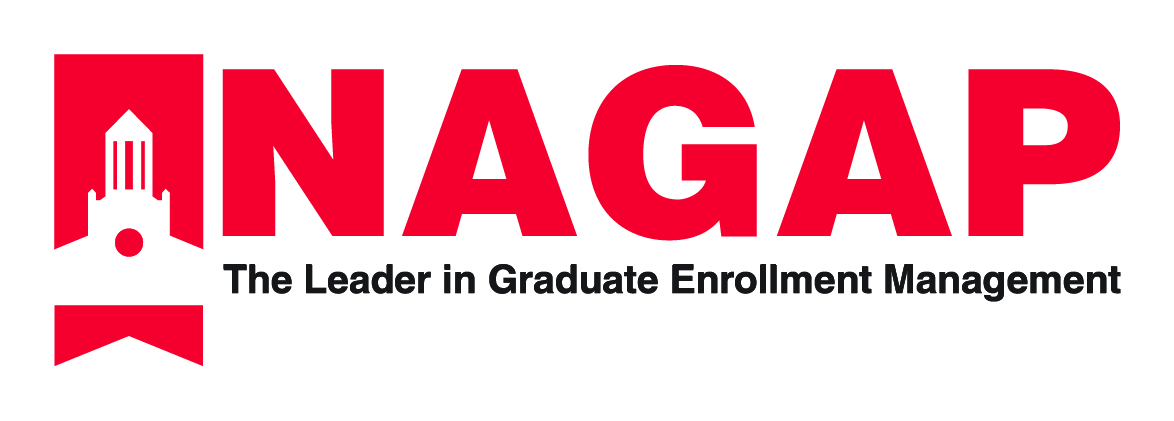You are on CGS' Legacy Site.
Thank you for visiting CGS! You are currently using CGS' legacy site, which is no longer supported. For up-to-date information, including publications purchasing and meeting information, please visit cgsnet.org.
Featured
FOR IMMEDIATE RELEASE:
Contact: Katherine Hazelrigg (202) 461-3888 / khazelrigg@cgs.nche.edu
Washington, DC – The Council of Graduate Schools (CGS) has awarded the 2019 Gustave O. Arlt Award in the Humanities to Dr. Nasser Mufti, associate professor of English at the University of Illinois at Chicago. The awards ceremony was held during the CGS 59th Annual Meeting in Nashville, TN.
The Arlt Award is given annually to a young scholar-teacher who has written a book deemed to have made an outstanding contribution to scholarship in the humanities. Dr. Mufti becomes the award’s 49th recipient for his book, Civilizing War: Imperial Politics and the Poetics of National Rupture (Northwestern UP, 2017). He received his PhD in Comparative Literature from the University of California, Irvine in 2012.
In Civilizing War: Imperial Politics and the Poetics of National Rupture, Mufti situates the place of civil war within the politics of empire by examining the “historical transformation of civil war from a civil affair into an uncivil crisis.” Through comparative readings of Thomas Carlyle, Benjamin Disraeli, Friedrich Engels, Nadine Gordimer, and others, Mufti demonstrates how these authors and intellectuals articulated a “poetics of national rupture” that came to signify the metropolitan nation and its colonial “others.” Through Civilizing War, Mufti “shifts the terms of Edward Said’s influential Orientalism to suggest that imperialism was not only organized around the norms of civility but also around narratives of civil war.”
“We are so pleased to present this year’s Arlt award to Dr. Mufti for the outstanding scholarship in his recent book Civilizing War. The Arlt award recognizes exceptional work by early-career humanities faculty, and Dr. Mufti’s work is an important contribution to understanding the complexities of imperialism and the inherent incivility of civil war,” said Dr. Suzanne Ortega, president of the Council of Graduate Schools.
Created in 1971, the Arlt Award honors the first president of CGS, Gustave O. Arlt. The winner must have earned a doctorate within the past seven years, and currently be teaching at a North American university. Nominations are made by CGS member institutions and are reviewed by a panel of scholars in the field of competition, which rotates annually among seven disciplines within the humanities. This year’s field was World Language and Literature, Comparative Literature, and Drama/Theater Arts. The winner receives a $1,000 honorarium and travel to the awards ceremony.
###
The Council of Graduate Schools (CGS) is an organization of approximately 500 institutions of higher education in the United States and Canada engaged in graduate education, research, and the preparation of candidates for advanced degrees. The organization’s mission is to improve and advance graduate education, which it accomplishes through advocacy in the federal policy arena, research, and the development and dissemination of best practices.
Contacts:
Katherine Hazelrigg, Council of Graduate Schools
(202) 461-3888 | khazelrigg@cgs.nche.edu
Alison Roth, ProQuest
(734) 707-2691 | alison.roth@proquest.com
Washington, DC – The Council of Graduate Schools / ProQuest Distinguished Dissertation Awards, the nation’s most prestigious honors for doctoral dissertations, were presented to Kishauna E. Soljour and Brian M. Sweis during the Council’s award ceremony at the 59th Annual Meeting in Nashville, TN. Dr. Soljour received her PhD in May 2019 at Syracuse University in history, and Dr. Sweis completed his PhD in 2018 from the University of Minnesota – Twin Cities in neuroscience.
Bestowed annually since 1982, the awards recognize recent doctoral recipients who have already made unusually significant and original contributions to their fields. ProQuest, an international leader in educational technology and content – including dissertation archiving, discovery, and access – sponsors the awards and an independent committee from the Council of Graduate Schools selects the winners. Two awards are given each year, rotating among four general areas of scholarship. The winners receive a certificate of recognition, a $2,000 honorarium, and a travel stipend to attend the awards ceremony.
“The Distinguished Dissertation Awards demonstrate the significant impact young scholars have in their disciplines,” said CGS President Suzanne T. Ortega. “Dr. Soljour and Dr. Sweis’s innovative research contributes and expands upon work in their fields and demonstrates the value and impact of graduate education to the world. Their work deserves to be celebrated."
“Drs. Soljour and Sweis are exceptional scholars who have contributed critical insights to their disciplines,” said Angela D’Agostino, Vice President of Product Management for ProQuest’s dissertation products. “ProQuest is proud to partner with CGS to recognize their excellence. The works these scholars have published will contribute to significant advancements in their fields of study, and we’re excited to follow where their research takes them in the future.”
Dr. Soljour received the 2019 Award in Humanities and Fine Arts for her dissertation, Beyond the Banlieue: French Postcolonial Migration & the Politics of a Sub-Saharan Identity. Using oral histories from Black communities in Paris to reveal a rich legacy of sociopolitical, economic, and cultural efforts to navigate and negotiate this divide, Soljour details and historicizes the space between French state acculturation policies and the lived experience of Afro-French residents from 1945-2018. Her project mines the experiences of black diasporic populations in Paris over the past seventy years to reimagine the place and power of race in contemporary French history. Dr. Soljour is currently a senior program manager at Working In Support of Education (W!se).
The 2019 Award in Biological and Life Sciences was presented to Dr. Sweis for his dissertation, Beyond Simple Tests of Value: A neuroeconomic, translational, disease-relevant, and circuit-based approach to resolve the computational complexity of decision making. By combining neuromodulation technologies targeted to circuit specific memories along with neuroeconomics to dissociate complex decision processes, Sweis links specific memories to how decisions are made and how each can uniquely go awry. Through his research, Sweis hopes to “better understand individual differences in pathogenesis and to develop novel interventions tailored to an individual’s circuit-specific computational dysfunction.” Dr. Sweis is currently a physician-scientist trainee at the University of Minnesota Medical School, where is he completing his M.D. in neuroscience.
More information about the CGS / ProQuest Distinguished Dissertation Award is available at www.proquest.com/go/scholars or at www.cgsnet.org.
###
About the Council of Graduate Schools (www.cgsnet.org)
The Council of Graduate Schools (CGS) is an organization of approximately 500 institutions of higher education in the United States and Canada engaged in graduate education, research, and the preparation of candidates for advanced degrees. The organization’s mission is to improve and advance graduate education, which it accomplishes through advocacy in the federal policy arena, research, and the development and dissemination of best practices.
About ProQuest (http://www.proquest.com)
ProQuest supports the important work in the world’s research and learning communities. The company curates six centuries of content – the world’s largest collection of journals, ebooks, primary sources, dissertations, news, and video – and builds powerful workflow solutions to help libraries acquire and grow collections that inspire extraordinary outcomes. ProQuest products and services are used in academic, K-12, public, corporate and government libraries in 150 countries.
Along with its companies and affiliates Ex Libris, Alexander Street, and Bowker, ProQuest helps its customers achieve better research, better learning and better insights. For more information, visit our ProQuest and Extraordinary Stories blogs, and follow us on Twitter, Facebook or Instagram.
For many, graduate study holds the promise of a better life and more secure financial future for the student and their family. Veterans share this interest in financial security when charting a career path after their military service ends. Tyler Mobra, a doctoral candidate in Educational Leadership and Policy Studies at the University of Oklahoma - Tulsa, is one such student veteran. After serving as a staff sergeant in the U.S. Army and being deployed to Iraq and Afghanistan, Mobra was awarded a Purple Heart and Bronze Star for heroic or meritorious service.
Returning home was difficult for Mobra. His valiant military career was over, and he was beginning to feel the financial squeeze of raising two children on a medical retirement pension. Though his children were young, he realized that they couldn’t “sleep on bunk beds forever,” and that providing for them the lives he wanted would require a new career. In these challenging times, support came in two forms. Operation Homefront helped Mobra acquire a mortgage-free home through their Homes on the Homefront program. This new home helped ease the immediate financial strain on Mobra and his family. Without this support, the Mobras would “be living paycheck to paycheck” without any hope of saving for the future.
If Homes for the Homefront helped alleviate Mobra’s immediate financial squeeze, the University of Oklahoma - Tulsa provided him a path to a financially stable and fulfilling career. Mobra has been working towards his doctorate since 2010 with the hopes of becoming a university professor. In acquiring his doctorate, he has already completed certification to teach grades K-12 in Oklahoma. His research focuses on how Oklahoma has responded to widespread teacher shortages in the state.
With his financial insecurity behind him and a promising career ahead of him, Mobra will be able to impart some of the heroism and life lessons he learned during his military service to the next generation of students. His story is a reminder of the role university communities can play in supporting American veterans and their families, as well as the ways graduate education can help students achieve financial security.
Visit the GradImpact Feature Gallery to learn more about the amazing, innovative research being done by graduate students and alumni across the world.
Image Credit: The University of Oklahoma – Tulsa
The CGS GRADIMPACT project draws from member examples to tell the larger story of graduate education. Our goal is to demonstrate the importance of graduate education not only to degree holders, but also to the communities where we live and work. Do you have a great story to share about the impact of master’s or doctoral education? Visit our WEBSITE for more information.
Many graduate students learn the importance of experimentation to good research through coursework, mentorship, and controlled lab environments. Wayne Johnson, a doctoral student in management at Cornell University, took a completely different path. As the leader of an Army counter-bomb unit in Eastern Afghanistan, Johnson had seen how bomb defusal and removal strategies designed for troops serving in Iraq were failing in Afghanistan. “After a month of heavy losses, I realized radical experimentation was needed,” he said. Johnson found that the new methods worked well and he was reassigned to the Army Research lab to teach what he had learned to others.
Johnson’s improvised counter-bomb strategy and time at the Army research lab taught him that “research was a powerful microphone to project voice and knowledge far beyond my reach as a tactics instructor.” As his interests shifted into the field of organizational behavior, Johnson wondered if he import the lessons he learned from his military service to other organizations. He thought the best path for achieving this goal would be to complete a Ph.D. in management at Cornell University’s Johnson School of Business.
The transition was not easy. The writing requirements were more than Johnson expected and he felt that he was behind his peers who had already spent years studying organizational management at the undergraduate level. “I chose subjects for which I did not have deep experience or knowledge,” he noted, “so that naturally led to a steeper learning curve.”
One area that Johnson found did translate to graduate school was leadership. He had seen both successful and unsuccessful leaders in the Army and found that successful leaders were constantly engaged with their associates instead of only engaging when there was a problem or issue. “I learned that I should take time often to go find someone who usually only hears complaints and tell them, hey, I don’t have any complaints because you’re doing such a great job.” He found once a peer or subordinate felt valued as a person they were more likely to listen to and accept criticism. “It’s true that people often don’t care how much you know until they know how much you care.”
Johnson’s care for others has animated much of his service since leaving the military. He volunteered for a suicide hotline for three years. His experience working for the hotline taught him “how deep a need people have to be validated and heard.” Listening to others has always been a core component of Johnson’s worldview and one that will serve him well in the classroom. To learn more about Wayne’s work, visit the Cornell University website.
Image Credit: Cornell University
The CGS GRADIMPACT project draws from member examples to tell the larger story of graduate education. Our goal is to demonstrate the importance of graduate education not only to degree holders, but also to the communities where we live and work. Do you have a great story to share about the impact of master’s or doctoral education? Visit our WEBSITE for more information.
FOR IMMEDIATE RELEASE:
Contact: Katherine Hazelrigg (202) 461-3888 / khazelrigg@cgs.nche.edu
Washington, DC — Today the Council of Graduate Schools (CGS) announced grant funding from The Andrew W. Mellon Foundation for The Humanities Coalition, a new effort that will expand CGS’s work to understand and support the careers of PhDs. This latest endeavor seeks to further enhance our understanding of humanities PhDs and their careers and to refine humanities-specific strategies for curricular change and program improvement. One component of the new initiative is additional research to better understand the nature of early career transitions for humanists.
The project, a component of CGS’s Understanding PhD Career Pathways for Program Improvement project, builds upon three earlier phases of CGS Best Practice and research initiatives: a feasibility study supported by the Alfred P. Sloan Foundation and The Andrew W. Mellon Foundation; a survey development phase supported by Mellon, Sloan, and the National Science Foundation (NSF); and a data collection phase supported by Mellon and NSF. There are currently 70 universities contributing data to the project.
Through a competitive sub-award process, the new effort will select ten U.S. doctoral-granting institutions to develop and assess initiatives for better supporting humanities PhD students transitioning from graduate school into the workforce. CGS has also received additional support from Mellon to expand the number of institutions currently collecting data about the careers of PhD students and alumni in the humanities.
“The PhD Career Pathways project has already provided valuable information about the careers of humanities PhD alumni and the career aspirations of humanities PhD students,” said Suzanne Ortega, president of the Council of Graduate Schools. “With The Humanities Coalition, we hope to learn more about the kinds of transitions humanities PhDs face as they move from graduate school to career. Humanities PhDs have a wide variety of career pathways in front of them. We need to make sure they know what they are and how to access them.”
Richard Kurin, distinguished scholar and ambassador-at-large at the Smithsonian Institution and member of the CGS Employer Roundtable, provided a perspective from a large employer of humanities degree holders. “We know from CGS’s work on PhD career pathways that humanities PhDs are employed in all major sectors of the economy, and there is no doubt they play a critical role in leading and supporting cultural institutions,” Kurin said. “I am delighted to see that CGS is building on its important work by helping universities develop and refine practices that will help support successful transitions from humanities doctoral programs to a wide variety of career pathways. This can help fulfill the professional aspirations of talented, creative and accomplished scholars and also improve the institutions and causes they serve.”
Over the five-year project, an advisory committee (listed below) will guide CGS’s efforts to increase the impact and reach of the project and provide insights for addressing challenges and opportunities specific to various humanities disciplines. CGS will issue a Request-For-Proposals (RFP) to CGS member institutions to participate in the project as funded partners and will continue to work with its current partners to collect data in both STEM and humanities fields.
Advisory Committee Members:
- Carlos Alonso, Dean of the Graduate School of Arts and Sciences, Columbia University
- Antoinette Burton, PI, Humanities without Walls; Director, Illinois Program for Research in the Humanities; Professor of History and Gender and Women’s Studies, University of Illinois at Urbana-Champaign
- Susan Carvalho, Associate Provost and Dean of the Graduate School, The University of Alabama
- Joy Connolly, President, American Council of Learned Societies
- Elizabeth Dolan, Deputy Provost for Graduate Education, Lehigh University
- Patricia Easton, Executive Vice President and Provost, The Claremont Graduate University
- Daniel Fisher, Project Director, Humanities for All, National Humanities Alliance
- James Grossman, Executive Director, American Historical Association
- Paula Krebs, Executive Director, Modern Language Association
- Preselfannie Whitfield McDaniels, Dean, Division of Graduate Studies, Jackson State University
- Mary Papazian, President, San José State University
- Rob Townsend, Director of the Humanities Indicators and Director of the Washington Office, American Association of the Arts and Sciences
- Maren Wood, Co-Founder, Beyond the Professoriate
# # #
About CGS
The Council of Graduate Schools (CGS) is an organization of approximately 500 institutions of higher education in the United States and Canada engaged in graduate education, research, and the preparation of candidates for advanced degrees. The organization’s mission is to improve and advance graduate education, which it accomplishes through advocacy in the federal policy arena, research, and the development and dissemination of best practices.
By Hironao Okahana and Enyu Zhou
The Council of Graduate Schools (CGS) is a member association of over 480 U.S. and Canadian colleges and universities. Member universities vary in size, scope, and way that graduate programs are organizing and administering. Based on responses from the 200 universities that participated in the 2019 CGS Survey of Organization & Administration of Graduate Education, this brief provides selected insights into how graduate education is organized and administered in the U.S. and Canada. The finding affirms that the majority of responding institutions organizes the responsibilities of graduate education within an organizational unit** led by a dean. This organizational structure provides graduate education administrators with leadership roles that are similar in stature and expectations to those of academic colleges and collegiate deans. We also found that in addition to supporting graduate student success, the organizations responsible for graduate education, particularly at research-intensive institutions, also oversee postdoctoral trainees.
**The term “graduate schools” is formally or colloquially used to refer campus organizational units that hold the responsibility for graduate education across different fields of study. Although formal organizational labels vary between institutions (e.g., Graduate School, Graduate College, Office of Graduate Education, Graduate Division, etc.), in this brief, all such units are referred as “graduate schools” regardless of their formal names.
Key Findings:
- Overall, more than 64% of institutions responding to the survey indicated that their formal administrative name includes “Graduate School” or “Graduate College,” while 24% reported that their name includes a variation of “Office of Graduate Studies” or “Graduate Division.” The survey affirmed that 48% of graduate education organizations are led by a “Dean” and 27% are led by an “Associate/Vice Provost and Dean”. (Figure 1)
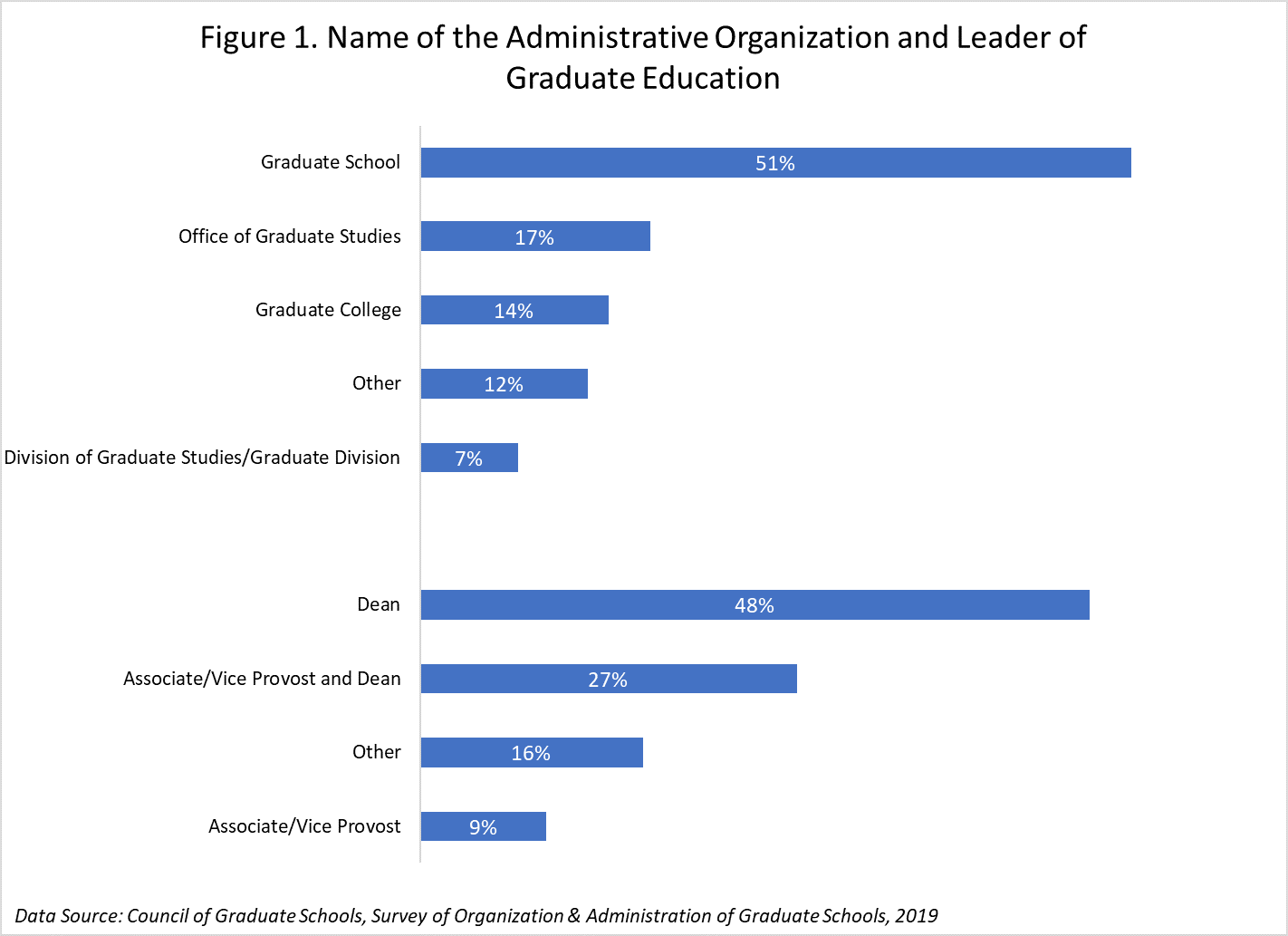
-
Roughly 48% of the graduate schools from R1 institutions have responsibility for postdoctoral affairs. While 31% of respondents from master’s colleges and universities and 20% of respondents from R2 and R3 institutions indicated that, in addition to graduate education, graduate schools are also responsible for research administration. None of the R1 graduate schools reported responsibility for research administration as an area of their oversight. (Figure 2)
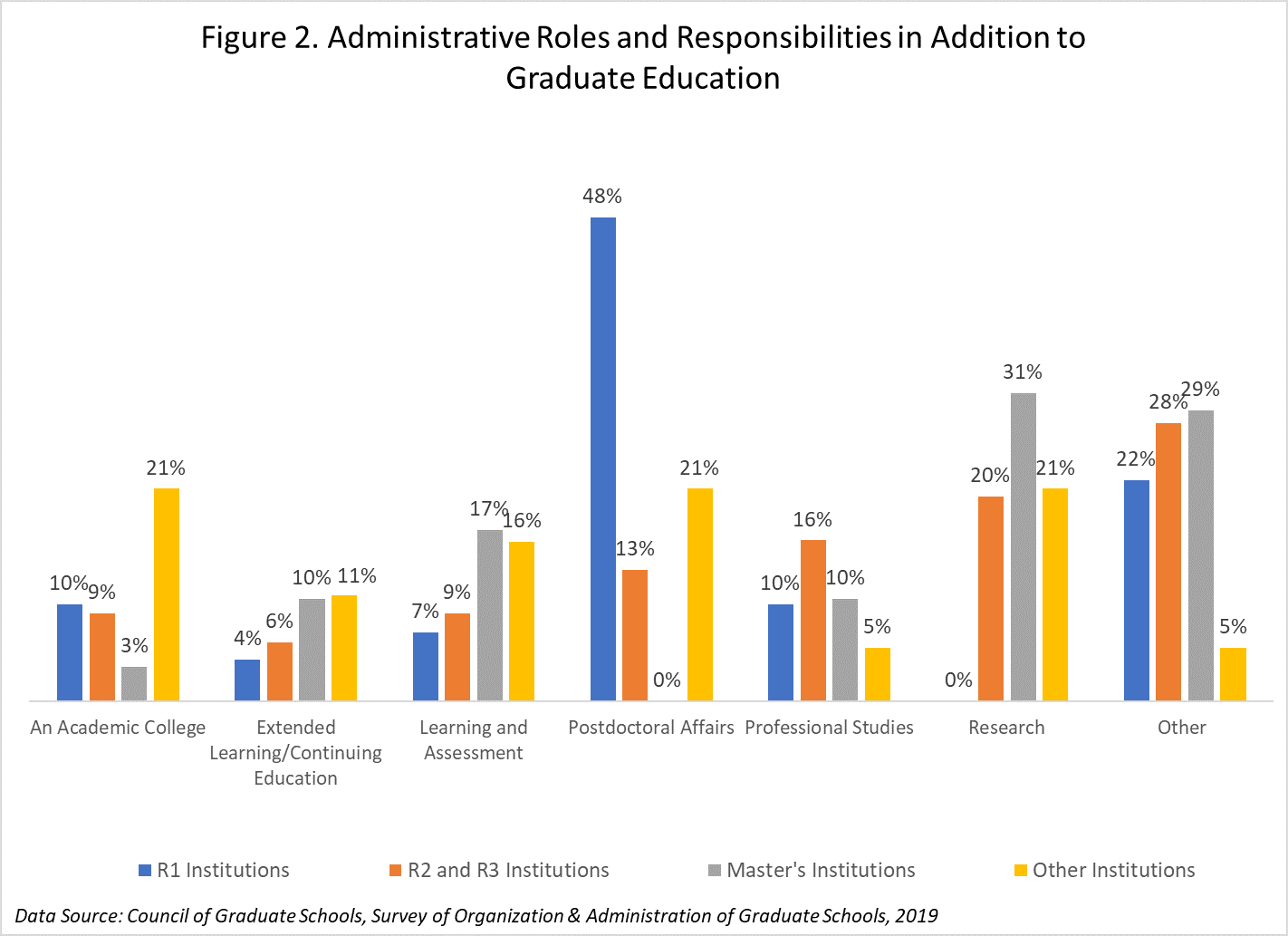
-
The average number of staff members supporting graduate schools was reported as 22 full-time equivalents (FTEs) at participating R1 institutions, 10 FTEs at R2 and R3 institutions, and 5 FTEs at master’s colleges and universities. The average number of graduate assistants and student assistants working in graduate schools was the highest at R2 and R3 institutions. (Figure 3)
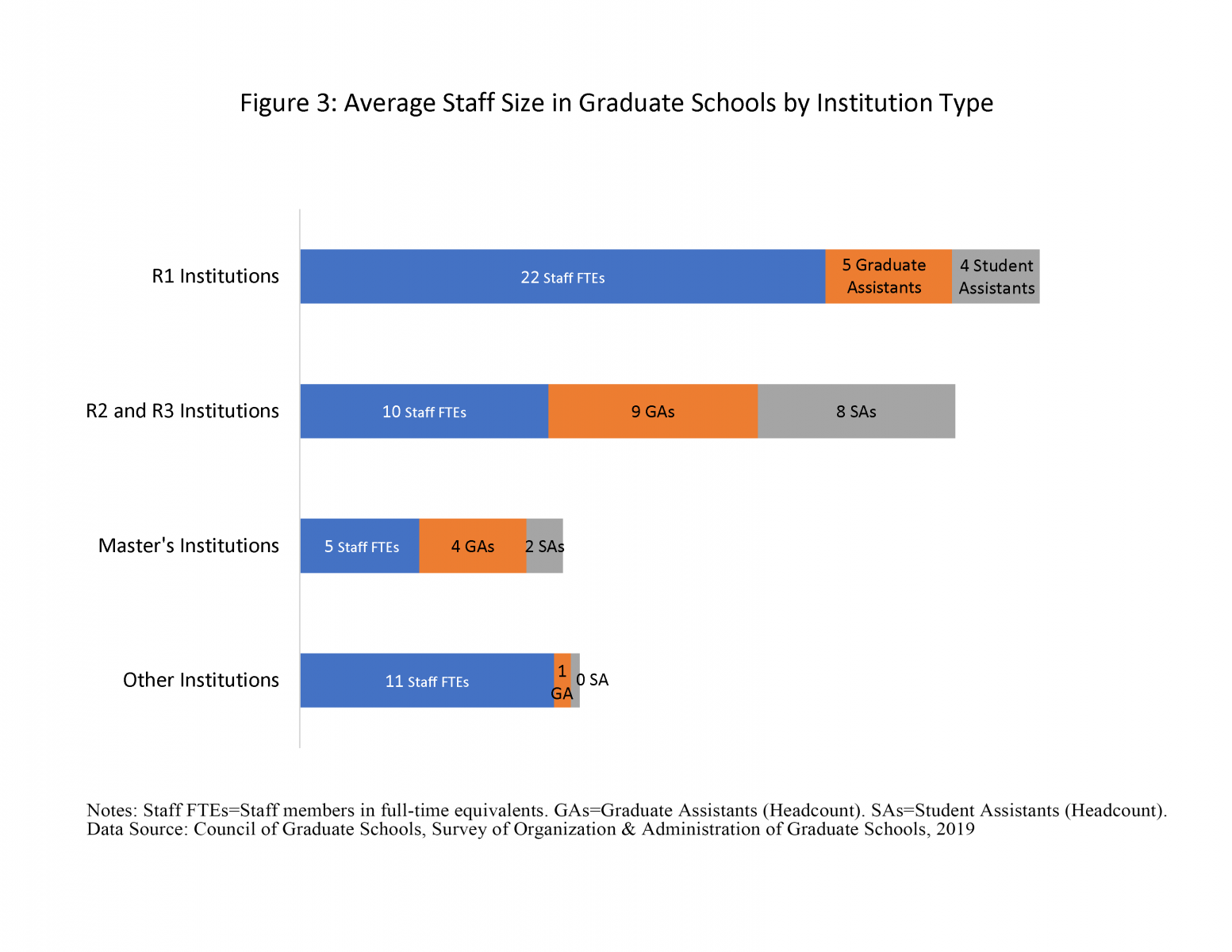
-
Approximately 50% of respondents indicated that their graduate schools have decision-making authority for setting academic policies governing graduate programs, establishing graduate admissions policies, monitoring the academic progress of graduate students, responding to academic grievances, and managing graduate admissions technology. In other areas, such as review of new and revised programs, development of new graduate programs, and review of/development of online graduate programs, more respondents noted that they have formal input into the decision-making processes at their institutions. (Figure 4)
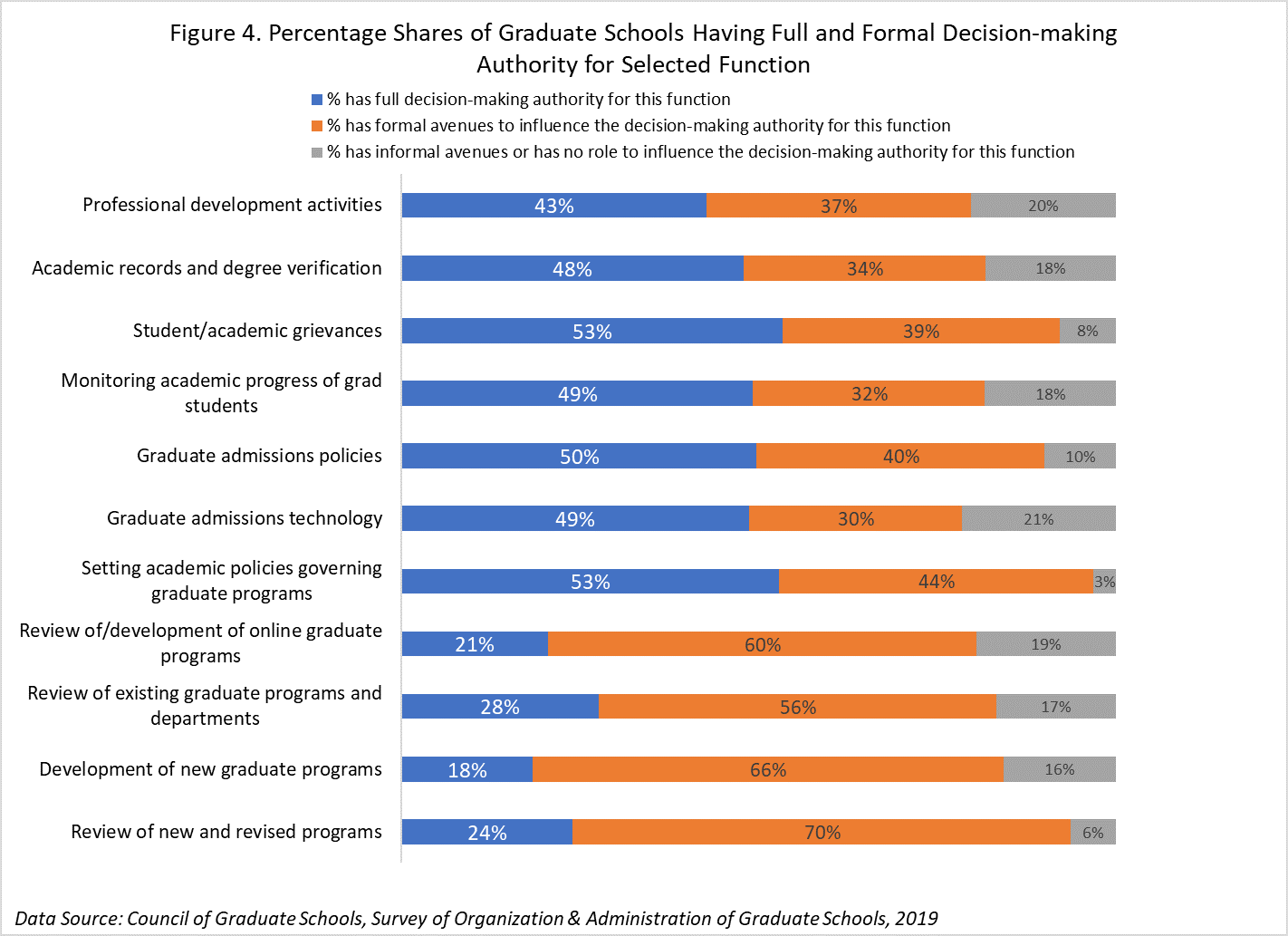
Takeaway Points:
- Based on the survey, the majority of institutions organize graduate education roles and responsibilities within a Graduate School or Graduate College, led by a dean, affirming that these organizational units and their leaders have roles and responsibilities that are similar in stature to academic colleges and collegiate deans at their home institutions. In other words, campus leaders of graduate education are at the same tables with collegiate deans and other senior academic leaders, ensuring that the interests of graduate education are represented in these ranks.
- At R1 institutions, 48% of graduate schools oversee postdoctoral affairs. This finding underscores the essential leadership roles that graduate schools provide to support the experience and success of postdoctoral trainees. In the same ways that graduate schools support the mentoring and career and professional development activities for graduate students, they are also positioned to provide these support services for postdoctoral trainees.
- Compared to R1 institutions, graduate schools and their deans at other types of institutions were more likely to have broader areas of responsibilities beyond graduate education. Given the relative sizes of graduate programs, it might make sense that these units oversee other areas; however, they also have relatively fewer FTEs to support their units. It may be the case that graduate education administrators at these universities are asked to do more with less.
- The findings highlight a central role in which graduate schools can play in setting academic policies and standards for graduate programs, such as graduate student admissions policies, graduate student academic progress, and grievances. However, they also amplify that in other areas, roles and responsibilities of graduate schools include insights that influence a broad range of decision-making processes across the institution. Influencing faculty hiring or curricular decisions underscores the importance of nurturing collaborative relationships with academic colleges and programs, as well as with other campus units, such as student affairs units in promoting interests of graduate education and graduate students.
Conversation Starters:
We encourage graduate education units to engage in conversation about various models for organization and administration of graduate education at your institutions. Some of the questions that you may want to ask as a self-reflection or to your campus colleagues (i.e., college deans, graduate program directors, etc.), as well as with stakeholders include:
- What kind of organizational structure does your unit have? How does the organizational structure align with your unit’s goals and priorities?
- Where is your unit housed? Which areas of responsibilities does your unit cover? How many staff lines does your unit have? How does organizational placement reflect institutional priorities for graduate education?
- How does your unit engage other units on campus? What types of formal and informal interactions do graduate deans (or equivalents) have with their campus peers? What types of formal and informal interactions do rank and file staff members in your unit have with their counterparts in academic colleges, graduate programs, and other units?
- What different functions does your unit have? What kind of staffing levels does your unit have for different functions?
Additional Resources:
The Organization and Administration of Graduate Education. This publication provides an overview of the structures, leadership, and strategies that define contemporary graduate education. It also provides case studies from selected graduate schools addressing pressing issues.
CGS Strategic Consultation Services. The Council of Graduate Schools provides strategic consultations to member and nonmember institutions, boards, and state agencies to offer guidance as they make tactical decisions about the administration of graduate education. Our consultations draw upon extensive best practice and benchmarking research as well as the insights of experienced graduate deans from around the country.
About the Data Source:
The Council of Graduate Schools, Survey of Organization & Administration of Graduate Schools was distributed to CGS member institutions and members of the four regional graduate school affiliations in Spring 2019 (US, N=195; and Canada, N=5). This brief is based upon the participants who reported working in one of the four institution types based on the 2015 Carnegie Classification of Institutions of Higher Education. The Basic Carnegie Classification categories are aggregated to four categories as follows: Universities with Highest Research Activity (R1 Institutions), Universities with Higher Research Activity and Universities with Moderate Research Activity (R2 and R3 Institutions), Master’s Colleges and Universities (Master’s Institutions), and Other Institutions. The sample size by institution type is as follows: R1 Institutions (N=71), R2 and R3 Institutions (N=65), Master’s Institutions (N=52), and Other Institutions (N=12).
Author Contribution and Acknowledgment
The brief was prepared by Hironao Okahana and Enyu Zhou. H.O. conceived and designed the project and data collection instrument, as well as supervised the findings of this work. E.Z. performed data cleaning and analysis, prepared the figures and table. Both authors discussed and contributed to the final brief. CGS President Suzanne T. Ortega and CGS Senior Vice President Robert M. Augustine, as well as Radomir Mitic, Janet Gao, and Christian P.L. West provided feedback to earlier drafts of the brief. CGS Best Practices Team, CGS Research and Information Services Committee, CGS Committee on Master’s Degrees, and CGS Consultation Working Group provided feedback to an earlier version of the data collection instrument.
A commitment to public service is a value shared by almost all veterans and active duty servicemembers. This commitment is also shared by many graduate students who hope to use their education for the betterment of their communities. It was the commitment to public service that spurred William LaRose, a master’s candidate in public administration at Cornell University, to pursue a graduate degree after serving four years in the US Army. “I knew I wanted to continue to service after the Army,” LaRose said, “and that I wanted to do so at a premier university and program.”
LaRose’s military service provided him with skills to help him succeed in his graduate program. “Time management, coping with stress, and working with diverse teams of people” were all important parts of his military training that translated into success at Cornell.
These skills have allowed LaRose to not only succeed in graduate school, but become a leader and role model for other students. He has channeled that leadership into volunteer work at Service to School, a veteran-run not for profit that connects veterans and active duty military with free college application preparation services. LaRose relied on Service to School to help him prepare his graduate school applications and now volunteers with the organization as an “undergraduate ambassador” to help other veterans get into college. He has also continued his military service with the New York National Guard’s 2-108th Infantry.
More than anything else, LaRose hopes that his example will encourage other veterans to apply to graduate programs. He recognizes the need for veteran’s leadership in many sectors of American life and views graduate school as one way to translate veteran experiences into civilian success. In the end, he found military service to be excellent preparation for graduate school. “To my fellow veterans,” he concluded, “you have the skills and experience to flourish at an Ivy League institution. Believe that. Our country needs your leadership now more than ever, so shoot for that top program, study hard, and continue to service the nation in whatever capacity you can.”
Visit the GradImpact Feature Gallery to learn more about the amazing, innovative research being done by graduate students and alumni across the world.
Image Credit: Cornell University
The CGS GRADIMPACT project draws from member examples to tell the larger story of graduate education. Our goal is to demonstrate the importance of graduate education not only to degree holders, but also to the communities where we live and work. Do you have a great story to share about the impact of master’s or doctoral education? Visit our WEBSITE for more information.
As a doctoral candidate in biology at the University of Notre Dame, James “Jayme” Hentig researches Traumatic Brain Injuries (TBI) and regenerative therapies. In 2017, he received a Graduate Research Fellowship from the National Science Foundation to develop and implement an innovative TBI model design for pre-clinical trials. His project requires managing budgets, collaborating with interdisciplinary teams at other universities, and overseeing junior scientists, all skills he honed while in the U.S. military.
Hentig joined the U.S. Army in 2008 as an airborne combat medic. His role required supervision of junior medics and ensuring the well-being of 120 personnel. He served in Europe before being deployed to Afghanistan. His experience there has greatly informed his research interests. Suffering a severe blow to the head, which caused a TBI, Hentig spent a year rehabbing before retiring from the Army in 2012. The trauma of the injury and the long road to recovery offered Hentig a new path. After leaving the Army, he earned a bachelor’s degree in neuroscience at Western Michigan University in 2016. His Honors Undergraduate Thesis, "Chemical Ablation with Zinc Sulfate Results in Differential Effects on Olfactory Sensory Neuron Subtypes in the Adult Zebrafish" received the 2016 Best Honors Thesis Award and serves as the basis for his doctoral research.
Using zebrafish, which have remarkable regenerative capabilities, Hentig hopes to develop a traumatic brain injury model and see how and if the brain of a zebrafish regenerates following blunt force trauma. “I love neuroscience because the brain is the center of individual existence,” Hentig said. “Furthering our knowledge and working towards regenerative therapies for individuals suffering from neurodegenerative diseases provides hope for not only the individual, but also for the families watching their loved ones slip in and out day by day.”
In addition to his doctoral work, Hentig serves as a STEM Mentor for the Warrior-Scholar Project, where he helps veterans transitioning from military service to civilian/student life. To learn more about James’s work, visit the University of Notre Dame website. To see the UND military spotlight on Hentig, visit their YouTube page.
Visit the GradImpact Feature Gallery to learn more about the amazing, innovative research being done by graduate students and alumni across the world.
Image Credit: University of Notre Dame
The CGS GRADIMPACT project draws from member examples to tell the larger story of graduate education. Our goal is to demonstrate the importance of graduate education not only to degree holders, but also to the communities where we live and work. Do you have a great story to share about the impact of master’s or doctoral education? Visit our WEBSITE for more information.
Nick Harnish is an applied master’s student in the School of Human Ecology at the University of Wisconsin—Madison with an emphasis in community organizing, human development, nonprofit management, and public humanities. He’s also a veteran of the U.S. Army, a former first responder, a volunteer with Wisconsin Hero Outdoors, and a Public Humanities Scholar with the UW—Madison Center for Humanities.
Harnish is using his broad and impressive range of experiences and expertise to turn a lighthouse on the grounds of Lakewood WWV Camp in Lake Geneva, Wisconsin, into a cultural retreat for veterans and first responders. “It’s going to be the beacon of hope for our veterans and first responders. A lighthouse is very fitting for that,” Harnish said.
Aptly named Havenwood, the outdoor wellness center is scheduled to open in spring 2020. Harnish’s certification in mindfulness-based stress reduction and experience with wilderness therapy will help ensure programs that work. “That’s where Havenwood is really unique,” he said. “I’m going to give you this space to be alone with your thoughts and your feelings and allow you to process them. And I want to give you the tools and resources to process it, versus forcing that process to happen.”
Harnish currently works at the Department of Military Affairs as a state program coordinator, organizing programs for military-connected youth. To learn more about Nick’s work, visit the University of Wisconsin—Madison website.
Visit the GradImpact Feature Gallery to learn more about the amazing, innovative research being done by graduate students and alumni across the world.
Image Credit: University of Wisconsin—Madison
The CGS GRADIMPACT project draws from member examples to tell the larger story of graduate education. Our goal is to demonstrate the importance of graduate education not only to degree holders, but also to the communities where we live and work. Do you have a great story to share about the impact of master’s or doctoral education? Visit our WEBSITE for more information.
By Hironao Okahana and Christian P.L. West
According to the Council of Graduate Schools (CGS), applications for admission to master’s programs increased by 1.4% and for doctoral programs by 4.1% between Fall 2017 and Fall 2018, while first-time enrollment in these programs grew by 2.0% and 2.9%, respectively (Okahana & Zhou, 2019a). Despite recent declines in international graduate enrollment (Okahana & Zhou, 2019a & 2019b), overall graduate enrollment at U.S. colleges and universities continues to grow, albeit modestly. This is not surprising as workforce demands for graduate degree holders are still growing in the United States. Jobs that require master’s degrees and doctoral degrees at the entry are expected to rise by 13.7% and 9.0% between 2018 and 2028, respectively (U.S. Bureau of Labor Statistics, 2019).
To gain insights about how graduate schools and programs are working to respond to this growing need for graduate degree holders, CGS collaborated with NAGAP, the Association for Graduate Enrollment Management to survey graduate enrollment management (GEM) professionals at U.S. and Canadian based institutions. Of the 167 respondents to the survey, 47.3% of GEM professionals reported that their institution or program has a robust enrollment growth target - 10% or more. In this brief, we discuss some of the insights gathered from this survey of GEM professionals.
Key Findings
- In addition to the national labor market and workforce demands, GEM professionals in the survey whose units have robust enrollment growth targets cited the importance of the reputation and ranking of the program/institution; availability of scholarship/fellowships; and campus/program climate as factors influencing decision to grow. The importance of these factors varied by specific institutional characteristics, including the Carnegie classification and public-private status. For example, regional and local labor market and workforce needs were more important at public institutions than their private counterparts. (Figure 1)
Figure 1.

Data Source: NAGAP, The Association for Graduate Enrollment Management & Council of Graduate Schools, Survey of Graduate Enrollment Management Professionals, Summer 2019.
- GEM professionals also cited increased resources such as additional full-time professional staff, implementation of a customer relations management system, institution-wide enrollment management strategy, and a dedicated budget for marketing and travel as critical to their ability to meet enrollment goals. (Table 1)
Table 1.
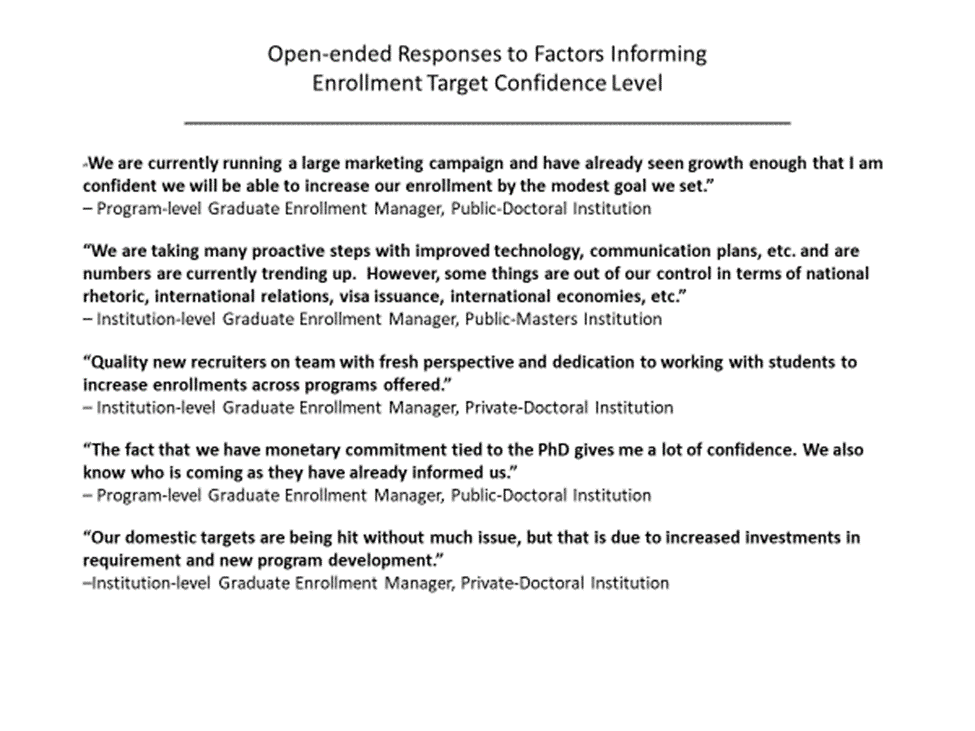
- Also, GEM professionals identified the reputation of the program/institution, campus climate, admission policies, and resources for recruitment as the top factors in their ability to increase the diversity of their incoming student body. (Figure 2)
Figure 2.
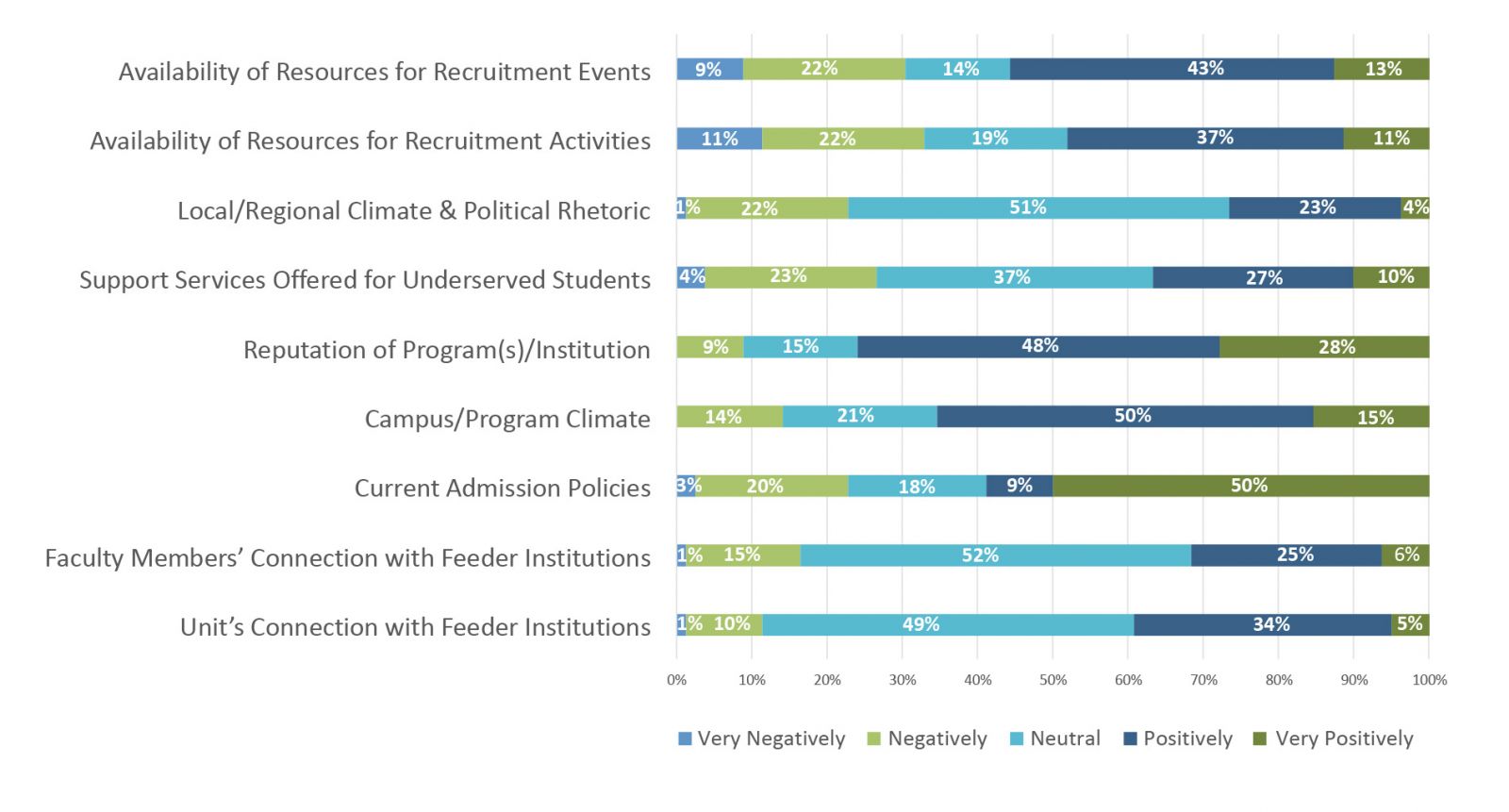
Data Source: NAGAP, The Association for Graduate Enrollment Management & Council of Graduate Schools, Survey of Graduate Enrollment Management Professionals, Summer 2019.
Takeaway Points
- Internal and external factors contribute to the setting of robust enrollment increase targets. There are both push and pull factors between program/institutional strengths and national, regional, and local workforce demands. This underscores the importance of aligning the strength of graduate programs with national, regional, and local labor market needs.
- In qualitative survey responses, GEM professionals make a direct connection between enrollment goal setting and institutional infrastructure. The alignment of goals and resources may increase confidence among GEM professionals in their ability to achieve their enrollment goals.
- While GEM professionals have confidence in their ability to achieve their overarching graduate enrollment goals for their units, they acknowledge meeting diversity goals as a different challenge. Given the positive influence of the reputation of institutions and graduate programs, as well as campus climate cited by GEM professionals, successful diversity recruitment strategies appear to require broader participation of stakeholders beyond GEM professionals.
Conversation Starters for Graduate Deans
- How do your graduate school and graduate programs use local, regional, and national workforce projections to determine enrollment goals?
- What resources can your graduate school and graduate programs leverage to meet the enrollment goals for specific segments of the recruitment pipeline,e.g., masters, doctoral, professional, domestic, international?
- What strengths can your graduate school and graduate programs leverage to successfully recruit a more diverse graduate student population in recruitment? How do diversity goals align with overall enrollment goals, strategies, and resource allocations?
Additional Resources
- Graduate Enrollment Trends: CGS/GRE Survey of Graduate Enrollment and Degrees and CGS International Graduate Admission Survey provide yearly snapshots and trends in graduate applications and enrollment across all fields of master’s and doctoral programs. Beyond the published report, requests for custom data reports can be made to CGS.
- The Outlook of the Workforce Needs: O*NET OnLine is an online tool for career exploration and job analysis sponsored by the U.S. Department of Labor. The web tool offers detailed insights, including projections of workforce needs and education and training needs for each occupation by the Standard Occupational Classification. Additional data may also be available via state and regional workforce development boards.
- Guides for Holistic Graduate Admissions: Two recent CGS projects: Innovation in Graduate Admissions through Holistic Review (supported by Hobsons) and Master’s Admission Attribute Study (supported by ETS) offer insights for promising practices in graduate admissions and enrollment management. NAGAP, The Association for Graduate Enrollment Management also offers the Holistic Admissions Resource Guide, as well as there are other efforts, such as Inclusive Graduate Education Network offers workshops for inclusive admissions practices.
References:
Okahana, H., & Zhou, E. (2019a). Graduate enrollment and degrees: 2008 to 2018. Washington, DC: Council of Graduate Schools.
Okahana, H., & Zhou, E. (2019b). International graduate applications and enrollment: Fall 2018. Washington, DC: Council of Graduate Schools.
U.S. Bureau of Labor Statistics. (2019). Table 5.2 Employment, wages, and projected change in employment by typical entry-level education (Employment in thousands). Retrieved from https://www.bls.gov/emp/tables/education-summary.htm.
About the Data Source:
The 2019 NAGAP/CGS Survey of Graduate Enrollment Management Professionals was developed by CGS, in consultation with NAGAP, and sent out to NAGAP members throughout July – August 2019. This brief is based on the deidentified, individual-level data file of 167 respondents. 91% of respondents voluntarily identified their institution and institutional characteristics were added to the data file using 2015 Carnegie Classification information. Analysis for this brief is based on a sample of 47.3% (N=79) institutions identifying a goal to increase overall enrollment by 10% or higher. These institutions break out into public Doctoral institutions (N=20), private Doctoral (N=12), public Masters institutions (N=10), and private Masters institutions (N=10).
Author Contribution and Acknowledgment
The brief was prepared by Hironao Okahana and Christian P.L. West. H.O. conceived and designed the project and data collection instrument, as well as supervised the analysis for this work. C.W. performed data cleaning and analysis, prepared the figures and table. Both authors discussed and contributed to the final brief. Suzanne T. Ortega, Enyu Zhou, Radomir Ray Mitic, and Janet Gao also provided feedback to earlier drafts of the brief. NAGAP, The Association for Graduate Enrollment Management provided feedback to earlier versions of the data collection instrument and administered the survey to its members. Any opinions, findings, and conclusions or recommendations expressed in this brief do not necessarily reflect the views of NAGAP.
